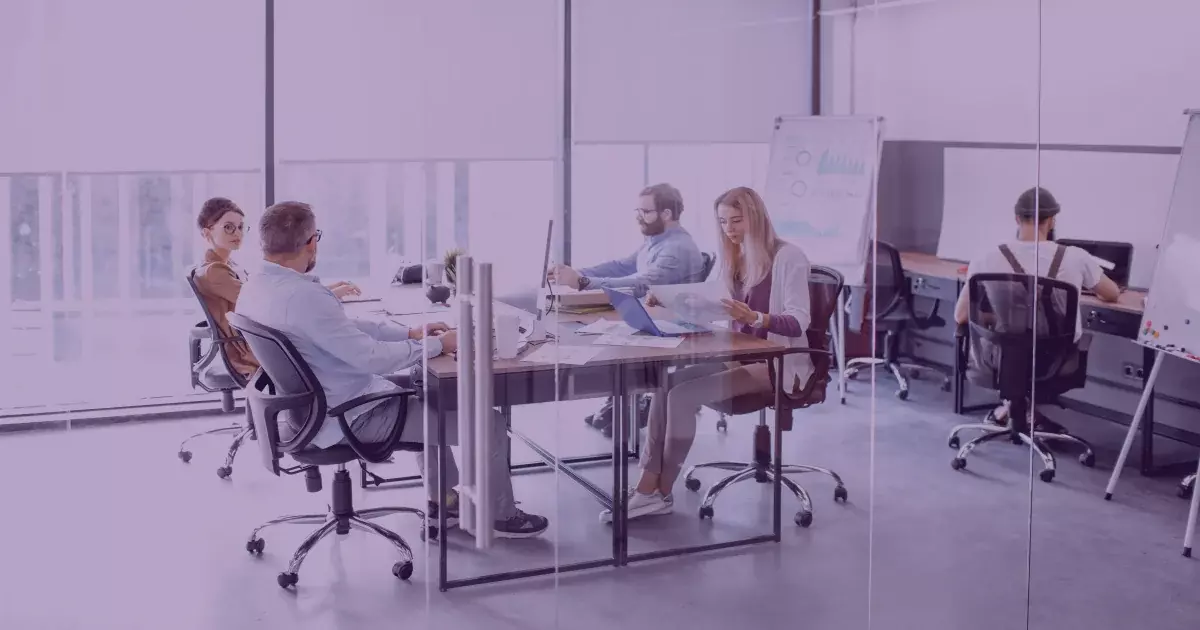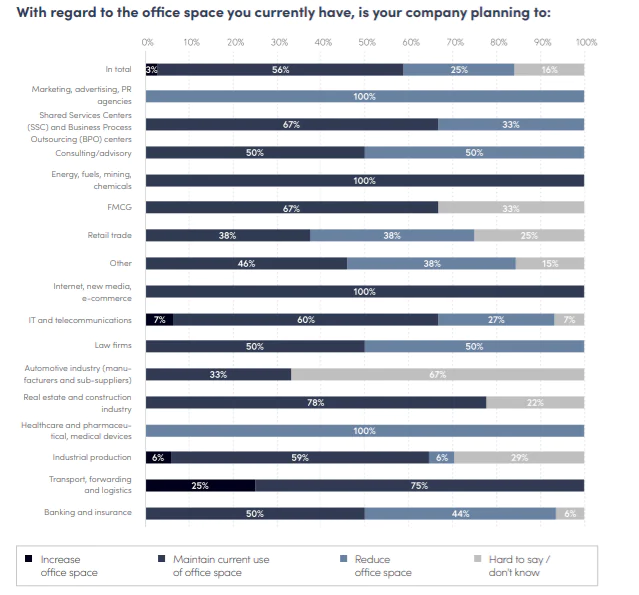Limitation of office space? Employers say no

Table of contents
Most employers (56%) plan to maintain the current use of office space, according to a study by Antal and Corees Poland. It’s due to the fact that employees, despite the expectations of an increased amount of remote work, still expect their own place and desk in an attractive office space (58% of responses). What are employees' expectations of office space (versus remote work)? What is the hub & spoke model? What are the challenges for employers of changing jobs?
Key information:
- Most of the surveyed employers (56%) plan to maintain the current use of office space, showing visible preferences for working in the hybrid model.
- Working in a remote model, contrary to appearances, doesn’t bring large savings to companies - 69% of employees expect additional benefits due to the change in the work model.
- Employees who spend less than 30 minutes commuting are more willing to return to the office than those who take longer to get to work.
Offices won’t necessarily go down
Contrary to popular belief, most companies don’t plan to reduce their office space. 56% of the surveyed employers plan to maintain the current use of the workspace. Some industries even plan to increase them. When analyzing the results of the study, three groups can be distinguished, consisting of various industries. The first group consists of companies planning to maintain or increase the currently occupied office space (67% - 100%), which includes the following sectors - SSC / BPO, energy, FMGC, IT, real estate, industrial production as well as transport, shipping and logistics. The vast majority of these companies focus on hybrid work, but remote work prevails in second place. On the other hand, the energy industry completely excludes remote work (56% opt for a hybrid model, and 44% choose to work from the office). The second group includes companies that plan to reduce the currently occupied office space, or those that have not yet made a long-term decision regarding the use of office space. This group includes industries such as automotive and aviation, healthcare, retail and retail, marketing and others.
These sectors mostly choose to work in a hybrid model, with the exception of the marketing industry, which abandons this model entirely in favor of remote work (67%) and, to a lesser extent, office work (33%). In turn, the automotive industry mostly decides to work from the office (60%). The last group is characterized by the lack of a dominant decision on the use of office space, and the votes regarding the decision to maintain, expand or reduce the work space are evenly divided (50%: 50%). Companies that fit this model are law firms, consulting and banking companies. Industries that are not committed to a specific scenario most often opt for a hybrid model. Remote work is second, and office work is the least favored. Law firms completely decide to work in a hybrid model - emphasizes Marek Ciunowicz, CEO at Corees Poland.

The (r)evolution of offices continues
According to the surveyed employees, the office should play the role of a meeting place (40%), as well as administrative back-up facilities (29%). In view of the high expectations of employees - on the one hand, your own comfortable desk, on the other hand, large opportunities in the field of remote work - it is worth conducting internal surveys among employees to choose the best office organization from the perspective of a given company. The changing expectations of employees pose new challenges for employers. Professionals and managers declare that in order to work effectively from the office, they expect: locating the office in a closer neighborhood (37%), ensuring work safety (35%) or providing more work space per desk (35%). At the same time, it is not expected that remote work will generate as large savings as assumed by the companies. 69% of the surveyed employees declare that they expect the introduction of additional amenities in such a work model, e.g. the purchase of office equipment (38%) or a permanent salary increase (35%).
Although at the moment only every third employer plans to introduce such benefits sooner or later, in order to acquire attractive talents, companies will have to at least partially meet their expectations in terms of office arrangement or additional forms of support in the field of remote work. And that will generate costs. In view of these requirements, companies should more often consider changing their organization instead of limiting office space - comments Artur Skiba, President of the Antal Management Board.
Do you want to attract employees to your office? Provide them with access within 30 minutes
When analyzing the research results presented in the report, an interesting correlation can be observed in the answers given by the employees. Employees commuting to work in less than half an hour declare a higher willingness to return to the office after the pandemic. The opposite trend is also noticeable - people who spend an hour traveling both ways less often choose to work from the office in the new reality. This situation seems to have a clear potential for improvement as more than 70% of the respondents commute to work longer than 30 minutes. round-trip.
In view of the data provided, an interesting solution encouraging employees to return to the office may be organizing work in the hub & spoke model. We usually create a hub in a central, prestigious office location, which is important for the company's image, cooperation as well as attracting and retaining talents. On the other hand, the location of satellite offices, e.g. in smaller cities, allows, on the one hand, to save employees' time for commuting and to attract them to less drained markets. On the other hand - generate savings related to rental costs - notes Grzegorz Kmieciński, Director, Tenant Representation at Corees Polska - Is hub & spoke a future-oriented concept for companies? Definitely yes, although it should be remembered that it will not work in all conditions, therefore the implementation of such a model should be preceded by an appropriately selected study of the organization - he adds.
About the report: The report "Work model - employee performance and satisfaction" aims to answer these questions by summing up the experiences of several hundred employers and employees. In the report, we show which aspects of work (whether remote or in the office) are assessed as effective, which generate employee satisfaction, and which affect potential threats to the organization, such as increased turnover or inefficient internal communication.
The report can be downloaded here: https://en.antal.pl/insights/report/work-model-employee-performance-and-satisfaction
About the survey: The survey among 315 employers was conducted using the CAWI method in December 2020. The survey among 956 employees (specialists and managers) was conducted using the CAWI method in December 2020.
The report is prepared in cooperation with the commercial real estate agency Corees Poland www.corees.pl














